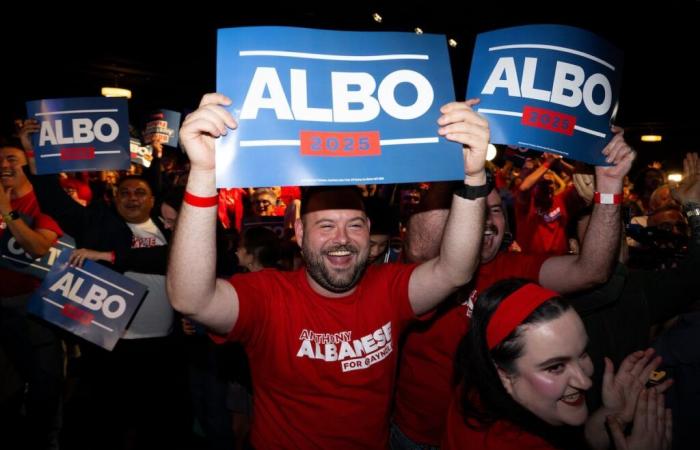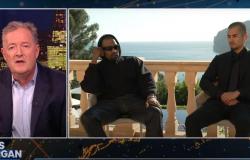
No Australian prime minister of the last two decades can boast of having achieved the re -election that the Labor Anthony Albanese has obtained, in power since 2022. The vote count of the Saturday elections has not yet ended this Tuesday, but, with a victory that awarded him at least 86 of the 150 seats of the House of Representatives – Diez more than necessary to reach the absolute majority. De Albanese is one of the greatest of a leader of the Australian Labor Center from Bob Hawke, the prime minister re -elected three times in the eighties. As it happened in the recent parliamentary elections in Canada, this result is interpreted as a symbolic plebiscite against the policies and commercial war of the president of the United States, Donald Trump, who in Australia has as an Émulo the rival of Albanese, the leader of the liberal-nationalist coalition, Peter Dutton.
The parallelism with what happened in Canada part of an analogous situation in both countries. Both Dutton and Pierre Poilievre, the leader of the Canadian conservatives, defend positions similar to those of Trump – hard man with the criminality and little tolerance to immigration – and led the surveys until the imposition of tariffs to imports from other countries and the diatribes of the Republican even against their narrower allies caused a turn to vote. Both moderate candidates – Mark Carny in Canada and Anthony Albanese in Australia – have ended up beating at the polls, while their conservative opponents received two varapalos.
Both Pailievre in Canada and Dutton in Australia have even lost their respective seats, which, in the case of the Australian, occupied since 2004. In the absence of definitive results in the southern country, of almost 27 million inhabitants, the conservative coalition is headed for at least 17 of the 56 seats he won in 2022.
The voters have been clear when opting for a new mandate in Albanese, but the path of the prime minister towards re -election has not been easy. The now chief of elected government coincides with his rival in which both are old stars of the traditional parties and in his trajectory of decades in Parliament. Their respective profiles are, however, diametrically opposite. The leader of the 62 -year -old Labor Party is the son of a single mother who worked by cleaning houses and ended up raising her son with a disability pension for arthritis in a public home of the Sydney suburbs. Dutton, 54, and leader of the liberal-nationalist coalition, is an plunder that, as Trump comes from the world of real estate investment, in his case in the Australian state of Queensland, in the northeast of the country, whose high crime rates inspired his hard hand policy.
The fundamental difference between the two was that the first came to the election to revalidate his position, with the consequent wear and tear by the government action. Above all, due to the high cost of life in the country and a housing crisis that expels young people from a real estate market charged by large investors. These factors explain that, during the year prior to the elections on Saturday, May 3, Voting intention polls will forecast Albanese’s defeat and grant victory to their rival, which was Minister of Interior and Migrations of the last conservative government (2018-2022).
Tornas change with tariffs
The trend was reversed in April, coinciding with the start by Trump of its World Trade War with the imposition of tariffs. The Australian media, very interested in the United States, began to inform the excesses of the Republican President against other leaders and the chaos unleashed in the US administration.
Until that time, Dutton had maintained a campaign slogan that echoed the Make America Great Again (Let’s make América Grande again) Trump. That motto was Let’s put Australia again. He abandoned him in silence, but it was late.
His proposals, in addition, resembled those of the US president. He promised, for example, to create a government department in charge of saying goodbye to some 40,000 public officials and prohibit working from home to the rest, in the style of Trump and Magnate Elon Musk have implemented in Washington. He also said he would relieve the real estate market for Australians by cutting the reception of migrants in 25% and prohibiting the purchase of homes from residents without citizenship for two years.
-Dutton accused progressive media as the newspaper during the campaign The Guardian or the state chain ABC of “promoting hatred” and said that Albanese was very focused on the “agenda woke”He alluded, for example, to the failed referendum of 2023, which sought to give a special place in Parliament to the aboriginal population when they were issues that would affect them.
The Australians had already taken note of the tariff plans of the US President to steel and aluminum, which represent about 6% of this export market in their country, and of its inventive ones against the European Union, Ukraine, and Canada, which sowed doubts about the reliability of its largest partner in defense. According to a survey carried out in April by the Lowy Institute, 64% of Australians have stopped trusting the “responsibility” of the United States, the first time that this figure exceeds more than half of the respondents in two decades. In parallel, many citizens stopped trusting the conservative opposition.
After his loud defeat – a lack of clear command voices in the conservative coalition – on Monday one of his great donors spoke, the mining magnate – and the richest person in the country – Gina Rinehart. “The leftist media made a very successful effort, scaring many in the Liberal Party and moving them away from any policy similar to Trump’s,” he wrote in a statement sent to the British tabloid The Daily Mail.
Unknown
How Albanes will handle the relationship with Trump is an unknown. The prime minister has been criticized for not maintaining a direct line with the Republican since the announcement of tariffs. Especially because Australia is one of the few countries that matters more than exports from the US, and the government is confident that this balance will guarantee an exception.
On Monday, while the re-elected prime minister gave his first press conference after revalidating his position and confirmed that he will travel to Canada in June as a special guest of Carney to G-7, Trump congratulated him from Washington when answering the question of a journalist. “The winner, Albanese, is a friend of mine,” he said. “The conservatives went wrong, as in Canada, and they are saying that it was for the ‘Trump effect,” replied the reporter. “I have no idea who is the person he faced in the elections,” said the president.
Meanwhile, in a gesture that marks a dividing line with Trump’s policies, Albanese dedicated the first words of his Sabbath Speech to the aboriginal inhabitants of Australia. “I want to recognize the traditional owners of the land where we have gathered,” said exultant at his militancy in Marrickville, his neighborhood of the west of Sidney. “I present my respect for the wise, past, present and emerging … today and every day!”
That phrase comes from an invocation called recognition of the territory. It is a millenary rite of aboriginal culture, the oldest current civilization of humanity, which modern Australia began to incorporate into different public acts in the 70s to recognize its original population, tensed by Western colonialism. This invocation is used in all kinds of events, from the opening of Parliament sessions to the landing of some International flights.
In Albanese’s mouth, the phrase was not a formality. The recognition of the territory had received whistles from some extreme right militants days before the elections, during a tribute to the Australian soldiers of the two world wars. The act, which brought together 50,000 people days before in the city of Melbourne, ended up muddy by the sour Cultural War fieled by the conservative opposition that has marked the electoral campaign. When they consulted for those whistles days before the election, Dutton condemned them, but defended that the use of that aboriginal invocation in so many acts was “exaggerated.”





